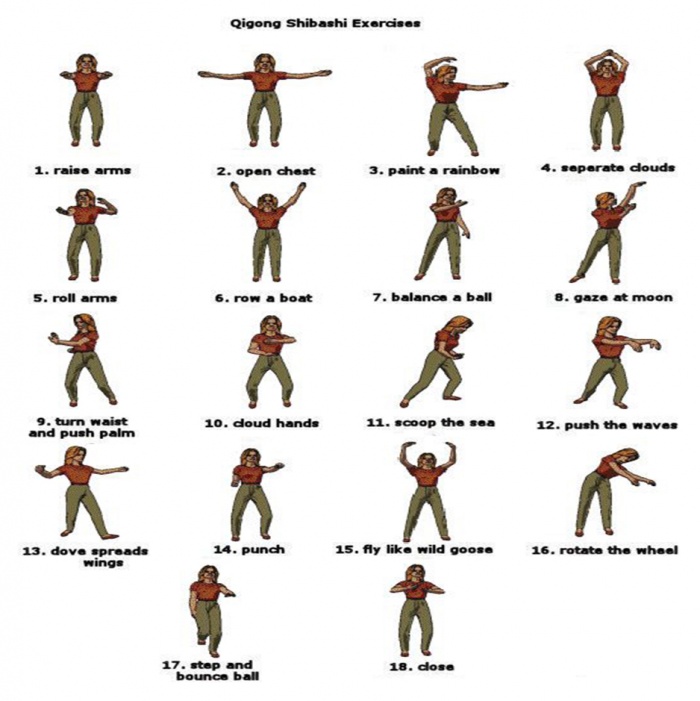Chinese and Western medicines can seem very different, but they do have one thing in common. The idea that prevention is the best medicine. Within Traditional Chinese Medicine, there are several pillars or overarching modes of treatment. All of which can be used as an active intervention in acute or chronic disease or preventatively to avoid disease entirely.
Four are performed by a practitioner: Acupuncture, External Therapies (such as cupping); Herbal Medicine; and Tuina (Chinese Medical Massage & Manipulation). The rest fall squarely on the shoulders of the patient highlighting the holistic nature of our medicine. They are performed by the patient and include Diet/Nutrition; Meditation; and Qi Gong.
Qi Gong is made up of two Chinese words. Qi (chee) is usually roughly translated to mean vitality or energy. Gong means skill or accomplishment that is cultivated through steady practice. Together, Qi Gong refers to cultivating energy, in that it promotes a sense of well-being and increases feelings of vitality.
A better definition of Qi Gong is an integration of physical postures, breathing techniques, and focused intention.
What can Qi Gong treat?
Evidence of Qi Gong’s therapeutic effects is slowly building with systematic reviews finding promising evidence of Qi Gong’s ability to:
reduce stress and anxiety including that caused by post-traumatic stress disorders
increase immune response and reduce inflammation
reduce hypertension both alone and when added to conventional therapies
eliminate symptoms of chronic fatigue
benefit those suffering from chronic pain
provide supportive care to those undergoing cancer treatment
How you can do Qi Gong?
There are many different styles and forms of Qi Gong that have been developed over thousands of years. Even the same set of movements can have many variations.
One popular form is called the Eight Pieces of Brocade that builds strength and flexibility with a seated version for people who are bedridden or cannot stand easily.
Always talk to your doctor before starting any new exercise plans
Another form that I often use myself and with my patients is called the Six Healing Sounds. It focuses on the importance of emotions and their specific and tangible effects on the human body.
This form targets anxiety, anger, fear, grief, and worry and works on shifting our focus to a positive emotion associated with each instead.
For example, the first sound and posture focuses on the Lung and Large Intestine systems and works to reduce grief and depression and replace it with courage.
Make an appointment today to learn more about how to perform Qi Gong and to see what Traditional Chinese Medicine can do for you and your health.
Come meet Dr. Ted in Morristown
Post References
Bai, Z., Guan, Z., Fan, Y., Liu, C., Yang, K., Ma, B., & Wu, B. (2015). The Effects of Qigong for Adults with Chronic Pain: Systematic Review and Meta-Analysis. The American Journal of Chinese Medicine, 43(8), 1525-1539.
Kim, S. H., Schneider, S. M., Kravitz, L., Mermier, C., & Burge, M. R. (2015, December). Mind-Body Practices for Posttraumatic Stress Disorder. Journal of Investigative Medicine, 61(5), 827-834.
Klein, P., Schneider, R., & Rhoads, C. (2016, July). Qigong in Cancer Care: A Systematic Review and Construct Analysis of Effective Qigong Therapy. Supportive Care in Cancer, 24(7), 3209-3222.
Lee, M. S., Pittler, M. H., Guo, R., & Ernst, E. (2007, August). Qigong for Hypertension: A Systematic Review of Randomized Clinical Trials. Journal of Hypertension, 25(8), 1525–1532.
Morgan, N., Irwin, M. R., Chung, M., & Wang, C. (2014). The Effects of Mind-Body Therapies on the Immune System: Meta-Analysis. PLoS ONE, 9(7). doi:10.1371/journal.pone.0100903
National Qigong Association. (2016). What is Qigong? Retrieved October 9, 2016, from National Qigong Association: http://nqa.org/about-nqa/what-is-qigong/
Wang, C.-W., Chan, C. H., Ho, R. T., Chan, J. S., Ng, S.-M., & Chan, C. L. (2014, January). Managing Stress and Anxiety Through Qigong Exercise in Healthy Adults: A Systematic Review and Meta-analysis of Randomized Controlled Trials. BMC Complementary and Alternative Medicine, 14(8). doi:10.1186/1472-6882-14-8
Wang, Y.-Y., Li, X.-X., Liu, J.-P., Luo, H., Ma, L.-X., & Alraek, T. (2014, August). Traditional Chinese Medicine for Chronic Fatigue Syndrome: A Systematic Review of Randomized Clinical Trials. Complementary Therapies in Medicine, 22(4), 826-833.




